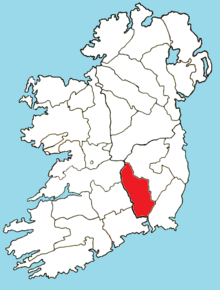Roman Catholic Bishop of Ossory
|
Diocese of Ossory Dioecesis Ossoriensis Deoise Osraí |
|
|---|---|

St. Mary's Cathedral, Kilkenny, the episcopal seat of the bishops of Ossory
|
|
| Location | |
| Country | Republic of Ireland |
| Territory | Most of County Kilkenny and parts of counties Laois and Offaly |
| Ecclesiastical province | Province of Dublin |
| Metropolitan | Archdiocese of Dublin |
| Statistics | |
| Area | 761 sq mi (1,970 km2) |
| Population - Catholics |
84,244 |
| Information | |
| Denomination | Roman Catholic |
| Rite | Latin Rite |
| Established | Diocese in 1111 |
| Cathedral | St. Mary's Cathedral, Kilkenny |
| Patron saint | St Kieran |
| Current leadership | |
| Pope | Francis |
| Bishop | sede vacante |
| Metropolitan Archbishop |
Diarmuid Martin, Archbishop of Dublin |
| Emeritus Bishops |
Laurence Forristal Bishop Emeritus of Ossory Seamus Freeman Bishop Emeritus of Ossory |
| Map | |
 |
|
| Website | |
| ossory.ie | |
The Roman Catholic Diocese of Ossory (Irish: Deoise Osraí) is a Roman Catholic diocese in eastern Ireland. It is one of six suffragan dioceses in the ecclesiastical province of the Metropolitan Archbishop of Dublin. The most recent Ordinary was bishop Séamus Freeman. On 29 July 2016, Freeman officially retired.
Its cathedral episcopal see is the Marian Cathedral of St. Mary of the Assumption, in Kilkenny.
The see is bounded to the south by the River Suir, to the east by the River Barrow, to the north by County Laois (formerly "Queen's County") and to the west by counties Tipperary and Offaly (formerly "King's County"). It has an area of 600,000 acres (2,400 km2) and contains the city of Kilkenny.
At the Synod of Rathbreasail in 1111, the limits of the diocese were permanently fixed. At the same time, the cathedra was transferred from Seir-Kieran to Aghaboe. At the end of the 12th century it was further transferred to Kilkenny. It is probable that St. Canice founded a monastery at Kilkenny and not unlikely that the beginnings of a town soon appeared there, to become more important when the bishops changed from Aghaboe.
The diocese was established in AD 1111 It is roughly co-extensive with the ancient Irish Kingdom of Ossory, whose first king, Óengus Osrithe, flourished in the 2nd century of the Christian era. His successors extended their boundaries to include part of Tipperary. In the 5th century the neighbouring tribe of the Deisi, aided by the Corcu Loígde, conquered South Ossory, and for over a century, the Corcu Loígde chiefs ruled in place of the dispossessed Ossory chiefs. Early in the 7th century the ancient chiefs recovered much of their lost possessions, the foreigners were overcome, and the descendants of Aengus ruled once more. One of the greatest was Cerball mac Dúnlainge, prominent in the 9th century and distinguished in the Danish wars.
...
Wikipedia
